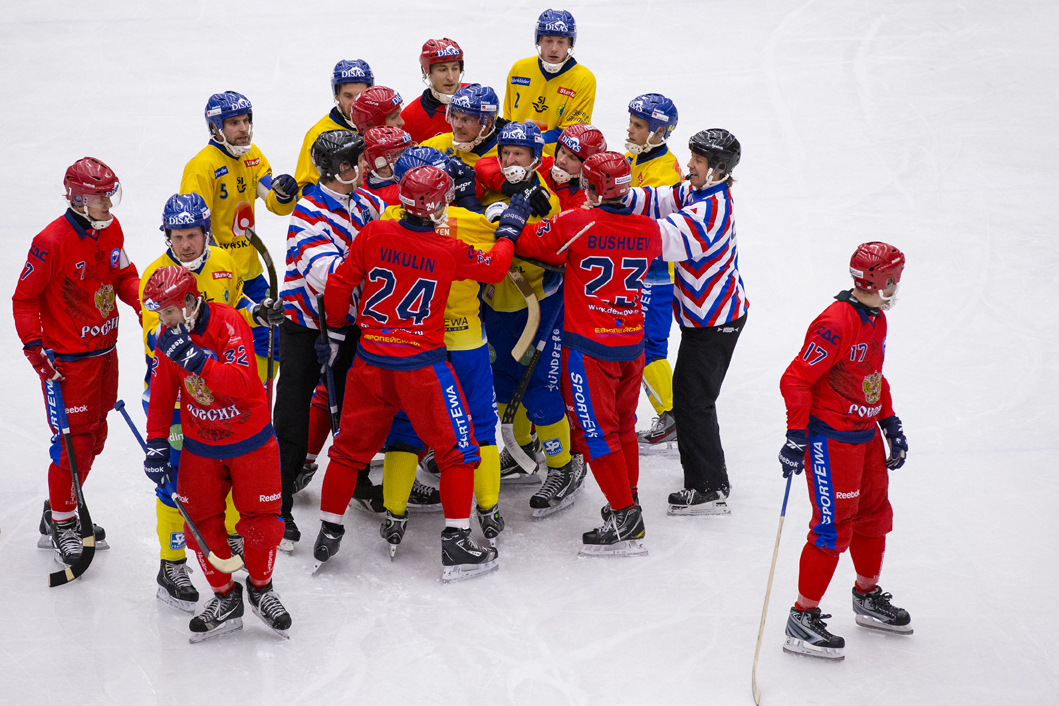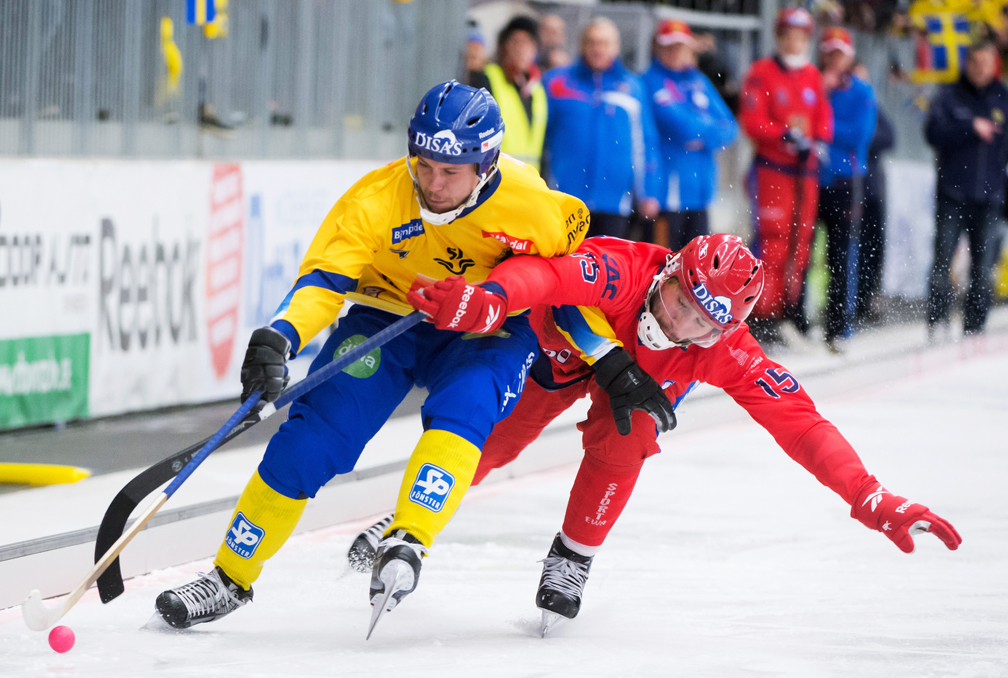Russia upends Sweden in bandy finals
Russia edged Sweden 4-3 to win the 2013 Bandy World Championship.
-
 Players from Sweden and Russia square off as Per Hellmyrs, center, and Sergey Lomanov trade punches during the Bandy World Championship. Michael Erichsen/Bildbyrån
Players from Sweden and Russia square off as Per Hellmyrs, center, and Sergey Lomanov trade punches during the Bandy World Championship. Michael Erichsen/Bildbyrån -
-
Sweden and Russia locked horns for the fourth straight year in the Bandy World Championship and after a match that featured a bench-clearing brawl, Russia skated away with the gold medal after a 4-3 win.
A crowd of 5,463 packed the arena in Vänersborg as the two teams took the ice Feb. 3 in the final. Sweden came into the game on a high after rolling up a world-record 28 goals in its win over Belarus in group play. Sweden went undefeated in the group, including a 7-5 win over Russia on Jan. 31. The blue and yellow beat Finland 10-2 in the semis.
The final, however, was tight from the start. Sweden went up 1-0 early in the first, but Russia reeled off three straight goals to take control of the game. Evgeny Ivanushkin scored two of the three goals to give Russia the lead.
The score could have been worse but for goalkeeper Andreas Bergwall, who made several huge saves to keep the Blågult close.
With eight minutes left, a huge collision at center ice sparked a brawl, with the referees trying to restore order while players spilled on and off the ice. Per Hellmyrs and Sergey Lomanov sparked just three minutes after restoring order, Ivanushkin collided with head referee Petri Kuusela, sending the official sprawling. Kuusela left the game with a concussion, a condition that seemed to affect all of the officials: Although there were clearly five minutes left when Kuusela left the ice, the remaining officials reset the clock to 3:50.
"First, the referee said there was five minutes, then he changed it to three, and so it somehow became a compromise of 3.50," said Hellmyrs. "It was not where we lost the match, but imagine what we could have done with that extra time.”
Patrik Nilsson made the game interesting as he scored twice in the closing minutes. Nilsson led the tournament in scoring with 21 goals, but was silent for most of the final. Yuri Sjardakov notched Russia’s deciding goal to put his team up 4-2 with 4:22 left to play.
“It’s sad that we couldn’t defend our title,” said Hellmyrs. “But everything felt unusually heavy today. Heavy with the game, heavy on the skates—we just didn't get our game going."
by Chipp Reid -
 Per Hellmyrs of Sweden and Alan Dzhusoev of Russia battle for the ball during the finals of the Bandy World Championship. Daniel Stiller/Bildbyrån
Per Hellmyrs of Sweden and Alan Dzhusoev of Russia battle for the ball during the finals of the Bandy World Championship. Daniel Stiller/Bildbyrån -
-
The sport of bandy
Bandy is still a fairly big sport in Finland, Norway and Sweden. It is played on ice, using a single round ball. Two teams of 11 players each compete to get the ball into the other team’s goal using sticks, thereby scoring a goal. The ice is about the size of a soccer field.
Games that are accepted as direct predecessors to bandy have been recorded in Russian monastery records dating back to the 10th or 11th centuries, while in the western world Britain has played an important role in the development of the sport. A game similar to bandy was known in Wales in the 1700s as bando—the sport generally considered a precursor to hockey and is still called hockey in Russia.
The U.S. has a national bandy federation (www.usabandy.com ) but it’s not a big sport here. We found it described somewhere as field hockey on skates.... Among the more unlikely countries to have a national bandy federation are Australia, India and Japan, but the majority of nations are in eastern Europe and central Asia.
Bandy was the more popular sport on ice in most parts of Europe in the 1900s. The main reason ice hockey later became more popular than bandy is that hockey became an Olympic sport, but bandy did not. In terms of audience, bandy is still among the ten most popular sports in Sweden but comes nowhere near hockey or soccer—both with more than 1.5 million spectators.
Bandy in Sweden: Svenska Bandyförbundet -
-
